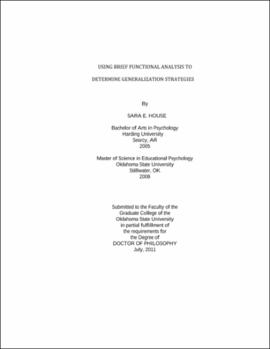| dc.contributor.advisor | Duhon, Gary J. | |
| dc.contributor.author | Sara E. House | |
| dc.date.accessioned | 2013-11-26T08:34:34Z | |
| dc.date.available | 2013-11-26T08:34:34Z | |
| dc.date.issued | 2011-07 | |
| dc.identifier.uri | https://hdl.handle.net/11244/7439 | |
| dc.description.abstract | Scope and Method of Study: The primary purpose of this study was to examine the utility of a BFA to identify effective generalization procedures for individual students. Through conceptualizing generalization as a behavior and a lack of generalization as a behavioral deficit the results of the current study extend the generalization literature. Specifically, this study built on the proposal that generalization is under stimulus control and therefore affected by antecedent and consequent manipulations. Furthermore, these different types of manipulations can be tested out to determine the most effective strategy for an individual student. A Small-N design with six students was utilized with two multiple baselines of 4 and 2 students. Initially, students were taught how to solve a set of multiplication facts using a skip counting strategy and spontaneous generalization to other sets of facts was measured. Next a BFA procedure was utilized in which an antecedent- and a consequent- based generalization procedure were administered to increase generalization across multiplication skills. Based on the results of the BFA, hypotheses were developed about the most effective generalization procedures and tested out in an extended analysis alternating treatment phase. | |
| dc.description.abstract | Findings and Conclusions: All six students displayed immediate gains with the skip counting strategy, and two of the students displayed levels of spontaneous generalization on accurate but not fluent responses of the generalization skill. Two multiple baselines were formed based on the level of spontaneous generalization, one for accuracy students and one for fluency students. For five of the six students, the antecedent cue was the most effective strategy in the BFA, and this was confirmed in the extended analysis. For the other student, a clear differentiation as not found in the BFA, but the antecedent-based procedure was more effective in extended analysis. Overall the results of this study confirm that generalization is a behavior and should be treated as such when programming is developed. As with all behaviors, individuals will differ in the amount of stimulus control needed to produce the behavior. However, the results of this study indicate that the amount and type of stimulus control can be identified through assessment procedures used to identify any effective behavioral intervention, such as BFA. | |
| dc.format | application/pdf | |
| dc.language | en_US | |
| dc.rights | Copyright is held by the author who has granted the Oklahoma State University Library the non-exclusive right to share this material in its institutional repository. Contact Digital Library Services at lib-dls@okstate.edu or 405-744-9161 for the permission policy on the use, reproduction or distribution of this material. | |
| dc.title | Using brief functional analysis to determine generalization strategies | |
| dc.contributor.committeeMember | Stinnett, Terry A. | |
| dc.contributor.committeeMember | Poncy, Brian C. | |
| dc.contributor.committeeMember | Allday, Allan | |
| osu.filename | House_okstate_0664D_11102 | |
| osu.accesstype | Open Access | |
| dc.type.genre | Dissertation | |
| dc.type.material | Text | |
| dc.subject.keywords | brief experimental analysis | |
| dc.subject.keywords | generalization | |
| dc.subject.keywords | math strategies | |
| thesis.degree.discipline | Teaching and Curriculum Leadership | |
| thesis.degree.grantor | Oklahoma State University | |
